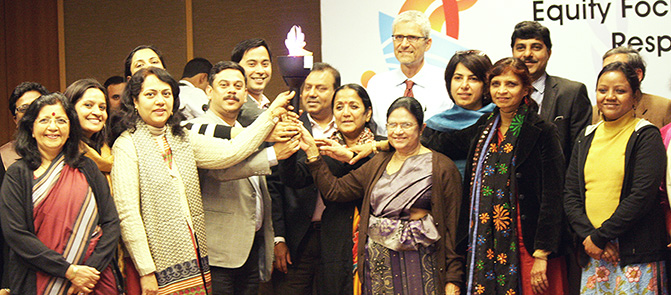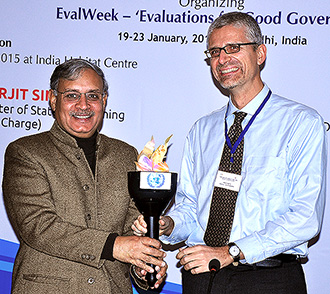UN WOMEN Seminar on Equity Focused and Gender Responsive Evaluation
Date:

Delhi - A seminar on ‘Equity Focused and Gender Responsive Evaluations’ was organized by UN Women India Multi Country Office to start the International Year of Evaluation. UN Women believes that such evaluations provide crucial evidence in advancing gender equality and women’s rights in the planning and implementation of existing and new schemes.
The seminar was held during ‘Evaluation Week’, 19-23 January 2015, co-organized by the National Institute for Labour, Economics Research and Development (NILERD) under the National Institution for Transforming India (NITI) AAYOG, [1] and attended by NITI AAYOG officials, representatives from United Nations agencies, donor organizations, experts, academicians and civil society.
The inaugural session featured the handing over of the ‘Evaluation Torch’ – symbolising increasing awareness and knowledge of evaluation – by Marco Segone, Director of the Independent Evaluations Office, UN Women, Vice-Chair United Nations Evaluation Group (UNEG), and Rao Inderjit Singh, Co-Chair, Eval Partners to the Minister of State for Planning. India was the first of 26 countries to receive the Torch, and the week was one of 26 country events culminating in an International Evaluation Conclave in Kathmandu, Nepal in November 2015.

Mr. Segone expressed his appreciation for India being the first country to accept the Torch, in his keynote address. Segone continued with a focus on evaluations in Sustainable Development, observing that the move towards the Sustainable Development Goals makes 2015 an important year for the global development community. “India’s new government provides the evaluation community a great opportunity for moving towards effective and efficient monitoring and evaluating.” he commented. This is important in the context of having a concrete National Evaluation Policy. to inform national development policies, rather than donor-led evaluation systems. Segone also emphasized the importance of mainstreaming gender and social equity in evaluations, commenting “We are looking at an evaluation process which not only looks at eliminating structural bottlenecks but also contributes to the empowerment process. Evaluation can be an agent of change for the world we want.”
The UN Women seminar shared key lessons from evaluations of programmes – such as the Joint Review Mission of the Central Government’s nationwide education scheme, the Sarva Shiksha Abhiyan; Evidence Systematic Review of Evaluations Of Gender-Integrated Health Interventions In Low And Middle Income Countries; and World Food Programme’s ‘Food for Work’. The session focused on the methodological challenges to manage and conduct an equity-focused and gender-responsive evaluation and the strategies to address them. One of the challenges highlighted by Mr. Segone was the resistance that equity focused evaluations face. “There has to be an understanding that evaluations are a technical process operating within a political environment and thus, one should be able to deliver evaluations within the right context and within the right timeframe,” he observed.
During the week Mr. Segone and UN Women Representative Rebecca Tavares met Arvind Panagariya, newly appointed NITI AAAYOG Vice-Chairman, and Ms. Sindhushree Khullar, Chief Executive Officer. Ms. Khullar chaired the final Evaluation Week session, stressing the need to develop a National Policy Framework; build national capacities at the state level to contextualise the evaluation framework to suit their needs; and report on concrete outcomes at the Evaluation Conclave in November 2015.

For more information on the International Year of Evaluation, please visit http://mymande.org/evalyear/
[1] The NITI AAYOG replaced the 65-year old Planning Commission through a Cabinet Resolution on January 7, approved by the Prime Minister on 1 January 2015. The Aayog will act as a think-tank and will recommend a National Agenda, including strategic and technical advice on elements of policy and economic matters.